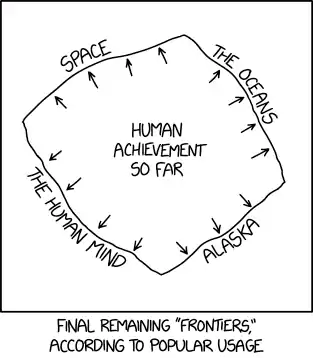2041: Frontiers
|
| Frontiers |
 Title text: Star Trek V is a small part of the space frontier, but it’s been a while since that movie came out so I assume we’ve finished exploring it by now. |
Explanation
This comic refers to four remaining “final frontiers” of human discovery, according to popular usage—perhaps analyzed using an Internet search engine. It seems to imply that other fields of research aren’t a challenge anymore.
Outer space is so vast in size that it’s impossible for humans to discover even just the stars in our galaxy within a lifetime. Space travel is also very difficult and expensive.
The oceans are very deep. The vast majority of the deeper oceans hasn’t been visited by humans, and there is still much we don’t know about the living beings in the deep sea.
The human mind is not only very complex, but also often seems irrational, which makes it harder to investigate. Its relation to the brain is also somewhat mysterious: philosophy of mind is split on whether the mind is ultimately material (materialism) or immaterial (dualism/idealism). Further, certain philosophical systems have trouble explaining its relation to the body, in what is termed the mind–body problem.
Alaska is the state of largest area in the U.S., and also the most sparsely populated. Many places in Alaska have only been partially explored to this day. Randall was probably inspired by the TV series Alaska: The Last Frontier, which plays off of the state’s official nickname of “The Last Frontier”.
The humor from this comic comes from the fact that Alaska seems comparably of less important than the other “Final Frontiers”. It is not as hard or expensive to explore as the ocean bottom and outer space, and it is much smaller. While one's own human mind is much more easily accessible than the other three locations, its nature is a substantial frontier in human knowledge. Furthermore, minds other than one’s own are very hard to access.
The title text refers to the movie Star Trek V: The Final Frontier, released in 1989. “Final frontier” is a recurring motif in the Star Trek franchise (coming from the opening narration for Star Trek: The Original Series), and is used to describe the exploration of outer space, which remains a notable frontier to humans, both in real life and within Star Trek. Randall, however, jokingly posits that the frontier to be explored is the film itself, and assumes that, because this movie has been out for a while—nearly thirty years—it ought to be fully and comprehensively explored by now.
Transcript
- [In a single framed picture a hand drawn rhombiod is shown. At the inside a few small arrows pointing to the four sides. The text in the middle reads:]
- Human achievement so far
- [Text above the top left side:]
- Space
- [Text above the top right side:]
- The oceans
- [Text below the bottom left side:]
- The human mind
- [Text below the bottom right side:]
- Alaska
- [Caption below the frame:]
- Final remaining “frontiers,” according to popular usage
![]()
![]()
![]()
Discussion
Most likely though of course not guaranteed reference for the title text is the recent stories out (about 2 days ago) saying that William Shatner regrets directing Star Trek V: The Final Frontier. Quick example of one story here --WJBodin3 (talk) 21:17, 3 September 2018 (UTC)
- I would find the timing very suspicious at the very least. I think it's highly likely the news inspired this comic, especially in light of Star Trek being outright named - and specifically that instalment. NiceGuy1 (talk) 13:22, 4 September 2018 (UTC)
It is interesting that all the current frontiers seem somewhat equidistant from the "center" of the squarish figure, as if we have achieved the same level of knowledge/exploration in each category... Daiemos (talk) 15:18, 4 September 2018 (UTC)
- Each is on its own (unlabeled) axis, scaled to imply parity among the topics. See 172.68.58.89 16:53, 4 September 2018 (UTC)
- ...finished exploring it by now (Title text)
If Randall means space and not the movie alone this would contradict the comic itself where space is still a big challenge. --Dgbrt (talk) 16:24, 4 September 2018 (UTC)
- I was thinking that myself, he could be saying that star trek has been fully explored, which the could be a slight reference to the relatively hot topic about star trek discovery. Some trekkies lamenting the fact that they didn't want another prequel... If on the other hand it is a reference to space itself, randall could have left the contradiction in on purpose, as part of the joke. 172.69.70.143 18:02, 4 September 2018 (UTC) Sam
- Actually the title text states that the movie is only a small part of the space frontier and also probably fully explored by now. So the diagram is about Space, not the movie.162.158.167.174 04:39, 5 September 2018 (UTC)
I, embarrassingly, thought it referred to "Looking for Alaska." I am not worthy of XKCDhood 162.158.78.10 00:36, 13 November 2018 (UTC)
I always assumed that the final frontier to which the title was referring was "Death". Brenda (talk) 09:28, 25 January 2020 (UTC)